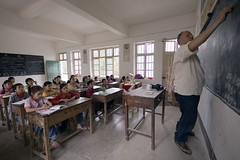The following is part of a blog posting by Randy Rodgers, an Instructional Technology Specialist in Birdville ISD, whose blog I read regularly. Read the post and then please share your thoughts with me in the comments section.
Evolution of a Teacher
What, exactly, is a teacher? Webster’s Dictionary defines a teacher as:
Teach”er\, n. 1. One who teaches or instructs; one whose business or occupation is to instruct others; an instructor; a tutor.
Teaching is primarily defined as “To impart the knowledge of; to give intelligence concerning; to impart, as knowledge before unknown, or rules for practice; to inculcate as true or important; to exhibit impressively; as, to teach arithmetic, dancing, music, or the like; to teach morals.” Alternately, it is defined as “To direct, as an instructor; to manage, as a preceptor; to guide the studies of; to instruct; to inform; to conduct through a course of studies; as, to teach a child or a class” or “to accustom; to guide; to show; to admonish.”
There are significant differences in these definitions. The first is more traditional, and it depicts the teacher as the provider, source, and demonstration of information needed for learning. The alternative definitions depict a different role entirely, that of one who leads others to the sources of information and understanding. The former entails a significant level of control over what is learned and how it is learned. The latter implies greater freedom on the part of the learner. The former, it might be argued, implies greater structure, while the latter implies a more random order.
In the past week, there have been a couple of experiences that have led me to consider just how our profession is evolving from one of a source of knowledge to one of a guide, who leads students through a vast sea of information, so that they may construct knowledge independently. The first was a discussion with a colleague about the fears expressed by a teacher that they would become obsolete. Change is inevitable, exciting, and terrifying. Technology is accelerating this change in education and in the world in general, by connecting us and giving us access to information on a scale unimaginable a few decades ago. It is easy to understand why this can be intimidating to a teacher. However, it is neither rational nor logical to expect that we will become obsolete. It is both rational and logical, however, to expect that our roles will be evolving, and that we will need to work to change our teaching practices to fit the needs of a new educational paradigm. The real challenge will be to develop enough of the critical literacy in teachers for them to be able to become the skilled navigators of information needed to lead our students to understanding. This is by no means a knock on a generation of educators, but it is a statement of the realities of our upbringing and education–information was different, smaller. The exciting part is, if we can change in these ways, the profession can become even more rewarding, as we will have the opportunity to witness so many more “a-ha” moments of self-discovery in our children. If we cannot, well, we very well may be on our way out.
Learning is about change and growth. The nature of information and access to that information is changing and growing, as well. Teachers are a resilient, dedicated lot, and we will adapt and excel, so long as we are willing to give up some degree of control and put it in the hands of our capable clients.
Read the entire post ... http://randyrodgers.edublogs.org/2009/05/07/evolution-of-a-teacher/.
Randy shared some very forward-thinking thoughts about how our roles as educators are changing, growing. I hope that his post inspired some thoughts about your teaching - how it has changed recently and how it will continue to change. Please share your thoughts with me in the comments section below.


0 comments:
Post a Comment